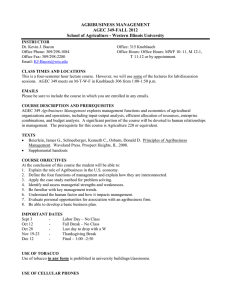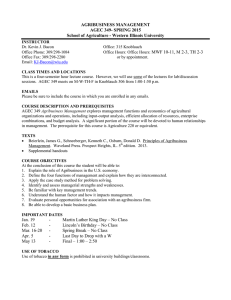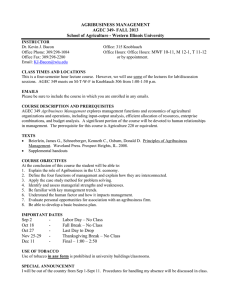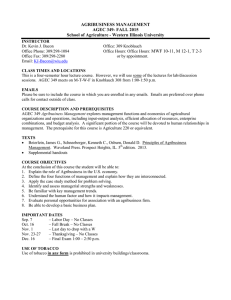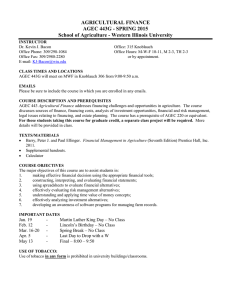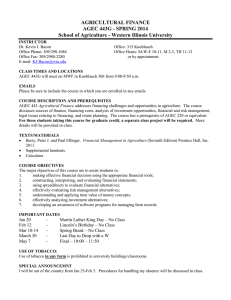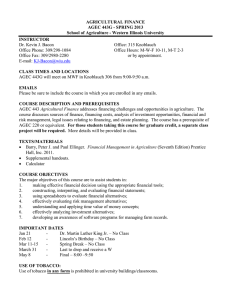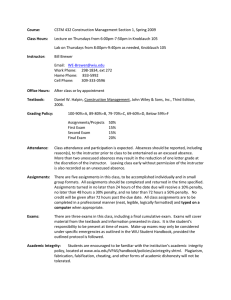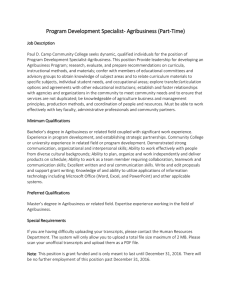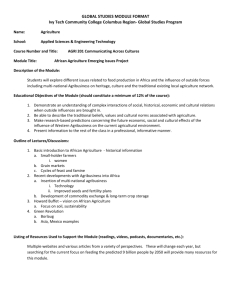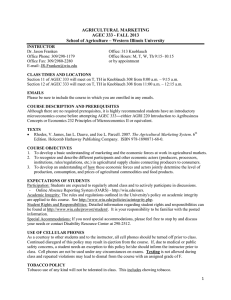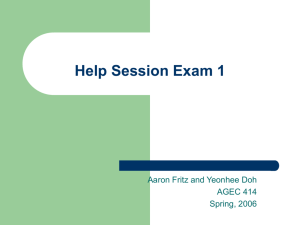AGRIBUSINESS MANAGEMENT AGEC 349- SPRING 2013 M-W-F 10-11, M-T 2-3
advertisement
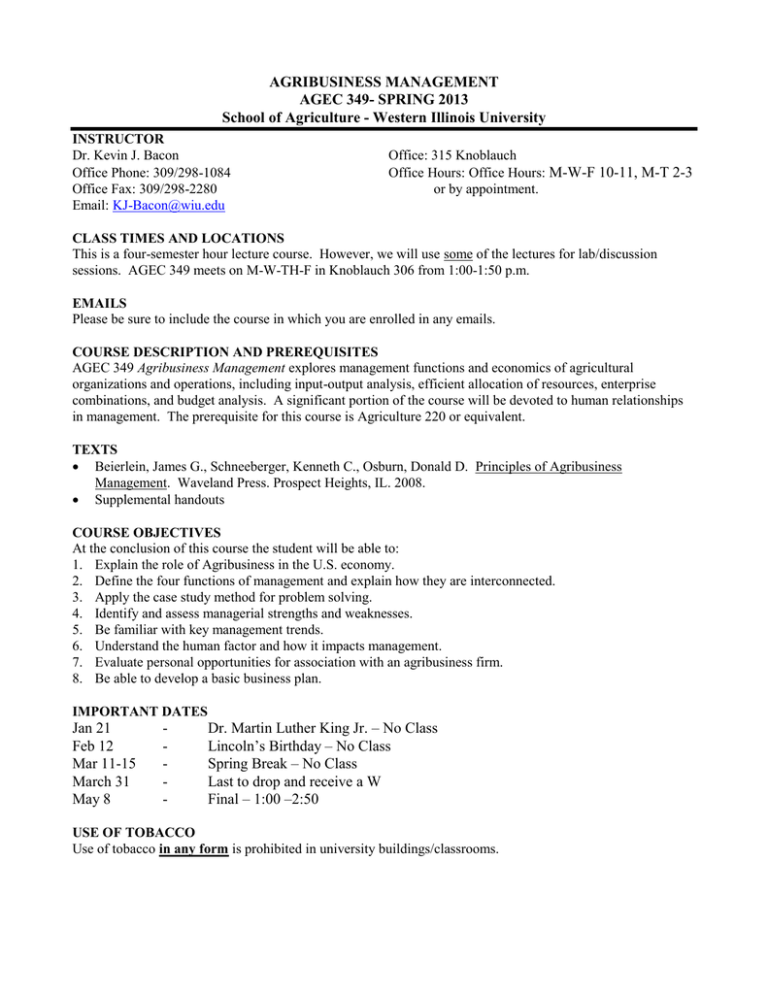
AGRIBUSINESS MANAGEMENT AGEC 349- SPRING 2013 School of Agriculture - Western Illinois University INSTRUCTOR Dr. Kevin J. Bacon Office Phone: 309/298-1084 Office Fax: 309/298-2280 Email: KJ-Bacon@wiu.edu Office: 315 Knoblauch Office Hours: Office Hours: M-W-F 10-11, M-T 2-3 or by appointment. CLASS TIMES AND LOCATIONS This is a four-semester hour lecture course. However, we will use some of the lectures for lab/discussion sessions. AGEC 349 meets on M-W-TH-F in Knoblauch 306 from 1:00-1:50 p.m. EMAILS Please be sure to include the course in which you are enrolled in any emails. COURSE DESCRIPTION AND PREREQUISITES AGEC 349 Agribusiness Management explores management functions and economics of agricultural organizations and operations, including input-output analysis, efficient allocation of resources, enterprise combinations, and budget analysis. A significant portion of the course will be devoted to human relationships in management. The prerequisite for this course is Agriculture 220 or equivalent. TEXTS Beierlein, James G., Schneeberger, Kenneth C., Osburn, Donald D. Principles of Agribusiness Management. Waveland Press. Prospect Heights, IL. 2008. Supplemental handouts COURSE OBJECTIVES At the conclusion of this course the student will be able to: 1. Explain the role of Agribusiness in the U.S. economy. 2. Define the four functions of management and explain how they are interconnected. 3. Apply the case study method for problem solving. 4. Identify and assess managerial strengths and weaknesses. 5. Be familiar with key management trends. 6. Understand the human factor and how it impacts management. 7. Evaluate personal opportunities for association with an agribusiness firm. 8. Be able to develop a basic business plan. IMPORTANT DATES Jan 21 Feb 12 Mar 11-15 March 31 May 8 - Dr. Martin Luther King Jr. – No Class Lincoln’s Birthday – No Class Spring Break – No Class Last to drop and receive a W Final – 1:00 –2:50 USE OF TOBACCO Use of tobacco in any form is prohibited in university buildings/classrooms. USE OF CELLULAR PHONES As a courtesy to other students and to the instructor, all cell phones should be turned off prior to class. Continued disregard of this policy may result in ejection from the course. If, due to medical or public safety concerns, a student needs an exception to this policy he/she should inform the instructor prior to class. Cell phones may not be used for any reason during an exam. Texting is not allowed during class and repeated violations will lead to dismal from the course with an assigned grade of F. GRADING POLICY The course grade will be based on the following factors, with weightings as indicated: Exam I 20 % A = 93% or above C- = 70-72.99% Exam II 20 % A- = 90-92.99%D+ = 67-69.99% Comprehensive Final Exam 30 % B+ = 87-89.99% D = 63-66.99% Quizzes and Homework 10 % B = 83-86.99% D- = 60-62.99% Group Project #1 10% B- = 80-82.99% F = <60% Group Project #2 10 % C+ = 77-79.99% Total 100% C = 73-76.99% Grade breaking points may be lowered, but in no case will they be raised. These breaking points will be evaluated only after final numerical grades have been calculated. Attention Education Majors: According to the changes within the state certification requirements, which go into effect immediately for all of those students who graduate in the spring 2012 and after, you are required to receive a grade of a "C" or better in this course in order to meet these new requirements. With the new university +/- grading system, receiving a "C-" or below will require you to retake this course or find a substitute course to meet School of Agriculture graduation requirements. Exams will consist of a wide variety of questions with emphasis on short answers and problem solving. The lowest quiz / homework score will be dropped. I reserve the right to use unannounced quizzes. The final will be comprehensive. Makeup exams will be given only in extreme situations. Assignments are due at the beginning of class. Late assignments will be docked 10% per day (including the due date.) Assignments will not be accepted after the homework has been discussed in class. GROUP PROJECTS Students will complete two team-based projects. The first project will focus on developing a fund-raising proposal. The second project will be to develop a business plan concept. More details on these projects will be provided in class. EXPECTATIONS OF STUDENTS Participation: Students are expected to regularly attend class and to actively participate in discussions. Academic Integrity: The rules and regulations outlined in the University's policy on academic integrity are applied to this course. Student Rights and Responsibilities: Detailed information regarding student rights and responsibilities can be found at http://www.wiu.edu/provost/student/. It is your responsibility to be familiar with the posted information. Special Accommodations: If you need special accommodations, please feel free to stop by and discuss your needs or contact Disability Resources Center at 298-2512. ACCREDITATION The School of Agriculture is housed in the College of Business and Technology which is accredited by AACSB-International. COURSE OUTLINE I. Introduction A. Introduction B. The Global Agri-Food System C. The Agribusiness Manager II. . The Planning Function A. Business Plan Elements B. The Role of Marketing C. Marketing Management D. Understanding Consumer Demand E. Consumer Complaint Behavior F. Workplace Teams G. Staying Competitive H. Introduction to Quantitative Methods I. Forecasting Reading Assignments Chapter 1 Chapter 2 Handouts Chapter 3 Chapter 4 Chapter 5 Handouts Chapter 6 Chapter 7 EXAM I III. IV. I. Budgeting J. An Introduction to Exporting (Optional) Chapter 8 Handouts The Organizing Function A. Organizing for Success B. Choosing a Legal Structure C. Agricultural Cooperatives Chapter 9 Chapter 10 Handout The Controlling Function A. Organizing Production (Optional) B. Product and Inventory Management C. An Introduction to Lean D. An Introduction to Six-Sigma Chapter 11 Chapter 12 EXAM II V. C. Using Basic Financial Statements D. Capital Budgeting Overview Chapters 13-14 Chapters 15-16 The Directing Function A. Human Resource Leadership B. Human Resource Management C. Personal Selling (Optional) D. Course Summary Chapter 17 Chapter 18 Chapter 19 Chapters 20 COMPREHENSIVE FINAL EXAM NOTICES Please be advised that this syllabus is tentative. All classes are different and we may or may not be able to address all of the content areas or stick with the anticipated number of exams. Any deviations from the syllabus will be announced as soon as possible.
